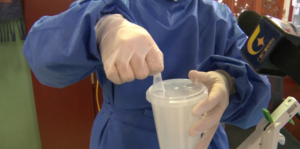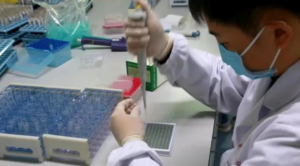
The latest answers from Dalian CDC! About the second dose of New Guan Vaccine booster
Vaccination against neo-coronavirus is the most economical and effective means of preventing and controlling neo-coronavirus infection. However, the antibody level of the vaccinated population gradually decreases over time, and the protection effect also gradually decreases, which requires a booster vaccination to raise the immune memory cells of the body and effectively improve the antibody level. In particular, people with underlying diseases and the elderly need to be immunized with a booster dose of the new coronavirus vaccine, so that it can play a particularly important role in “preventing serious illness” and “preventing death”.
The second dose of the new coronavirus vaccine (the fourth dose) is being administered in the city, and all districts and counties have opened second dose booster vaccination sites, so people can make appointments to receive the vaccination nearby.
Which groups of people are recommended to
Which groups are recommended to receive the second dose of booster vaccination?
At this stage, based on the first dose of booster vaccination, a second dose of booster vaccination can be given to people at high risk of infection, elderly people over 60 years old, people with serious underlying diseases and people with low immunity. Combined with the definition of heavy/critical high-risk groups in the Novel Coronavirus Pneumonia Treatment Protocol (9th Edition), the following groups can be subdivided.
- elderly people aged >60 years.
- those with underlying diseases such as cardiovascular disease (including hypertension), chronic lung disease, diabetes mellitus, chronic liver and kidney disease, and tumors
- immune deficiency (e.g. AIDS patients, long-term use of corticosteroids or other immunosuppressive drugs leading to a state of hypoimmune function)
- other susceptible groups: obese people, heavy smokers, women with late pregnancy and other groups are also more susceptible to infection because of their low immunity and poor health status and more risk factors than other groups.
Which vaccines can be selected at this stage
What is the second dose of booster immunization?
According to the progress of vaccine development, all vaccines approved for conditional marketing or emergency use can be used for the second dose of booster immunization. Priority will be given to sequential booster immunizations or second dose booster immunizations with vaccines containing or having good cross-immunity to Omicron strains, with the following combinations announced by the State.
3 doses of inactivated vaccine + 1 dose of Concionor intramuscular recombinant neocoronavirus vaccine (adenovirus vector type 5).
3 doses of inactivated vaccine + 1 dose of Zhifilongkoma recombinant neocoronavirus vaccine (CHO cells)
3 doses of inactivated vaccine + 1 dose of Recombinant Neocoronavirus vaccine (adenovirus type 5 vector) for inhalation by Conciano
3 doses of inactivated vaccine + 1 dose of Zhuhai Lizhu recombinant neocoronavirus fusion protein (CHO cells) vaccine.
2 doses of Concionor intramuscular adenovirus vector vaccine + 1 dose of Concionor recombinant neocoronavirus vaccine for inhalation (type 5 adenovirus vector).
3 doses of inactivated vaccine + 1 dose of Chengdu Wisk recombinant neocoronavirus vaccine (sf9 cells).
3 doses of inactivated vaccine + 1 dose of Beijing Wantai nasal spray influenza virus vector neo-coronavirus vaccine.
3 doses of inactivated vaccine + 1 dose of recombinant neocoronavirus protein subunit vaccine (CHO cells) from Zhejiang Clover
3 doses of inactivated vaccine + 1 dose of Shenzhou cell recombinant neo-coronavirus 2-valent S trimer protein vaccine.
For the time being, except for Chengdu Wisk recombinant neo-coronavirus vaccine (sf9 cells), Beijing Wantai nasal spray influenza virus vector neo-coronavirus vaccine, Zhejiang Clover recombinant neo-coronavirus protein subunit vaccine (CHO cells), Shenzhou cell recombinant neo-coronavirus 2-valent S trimer protein vaccine, all other vaccines are available in our city, and the general public can make appointments for vaccination on demand.
How long is the interval between the second dose and the first dose of booster vaccine?
How long is the interval required?
According to real-world research and clinical trial data at home and abroad, the interval between the second dose of booster immunization and the first dose of booster immunization is 6 months or more, taking into account the actual vaccination situation in China.
Can I receive the new crown vaccine after a negative reaction? How soon can I get vaccinated?
Can the second dose of booster immunization be administered?
If it is clear from nucleic acid testing or antigen testing that a person has recently been infected with a new coronavirus, it is not recommended that the infected person receive a new coronavirus vaccination in the near future. NeoCoronavirus vaccination can be given after conversion, with an interval of more than 6 months between the time of infection and the time of vaccination.
A number of studies have consistently shown that the immunity produced by infection with neo-coronavirus alone is weaker than the mixed immunity produced by infection superimposed on vaccination. It is recommended that people who have already been infected with NIV should receive a second dose of booster vaccination after 6 months to further improve their resistance to NIV.
When can people who have completed the basic immunization (three doses) with Zifiloncoma recombinant neocoronavirus vaccine (CHO cells) receive a booster immunization?
On December 25, 2022, the State Council Joint Prevention and Control Mechanism Integrated Group issued a notice that people over 18 years old who have completed the full course of vaccination (three doses) with Zifiloncoma recombinant neocoronavirus vaccine (CHO cells) for 6 months may receive one booster dose of the original vaccine.
*At the same time, the
The scope of the vaccination population has been adjusted accordingly.
Jiffy Longcoma recombinant neocoronavirus vaccine (CHO cells) can now be used for full immunization (basic immunization) for people aged 3-17 years, and the scope of vaccination has been extended to people aged 3 years and above.
For the basic immunization of people aged 3-17 years, in addition to Sinopharm Zhongsheng Beijing inactivated neo-coronavirus vaccine, Kexing Zhongwei inactivated neo-coronavirus vaccine and Sinopharm Zhongsheng Wuhan inactivated neo-coronavirus vaccine, people aged 3-17 years can also choose Zifei Longcoma recombinant neo-coronavirus vaccine for vaccination.


Average Rating